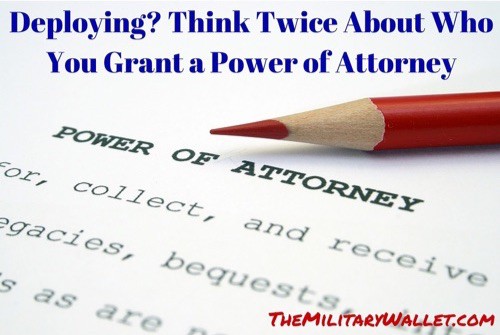Note: This article is for general informational purposes only and is not to be considered legal advice. Please visit with a professional legal representative before choosing which Power of Attorney is right for your situation. Your base legal department is a great place to start.
Granting someone you trust the power of attorney can be an immensely helpful tool to use while on deployment.
Under the power of attorney, the person acting as your agent can take care of your bank accounts, real estate, contracts, or anything else you choose to give them power over. This is especially helpful when you have urgent business that has to be taken care of in person, and you happen to be thousands of miles away.
With the power of attorney (POA), you can rest and work at ease knowing that while you focus on your job and tasks at hand, your matters at home will be well looked after.

What is a Power of Attorney?
A power of attorney, by definition, is a written document where a principal (you, the designator) designates authority to an agent (i.e. your trusted friend or family member) to act on your behalf. A POA gives an agent the ability to endorse checks, sign contracts, buy property, access bank accounts, and a number of other legal functions.
Not all Powers of attorney are the same, however. There are four different types of power of attorney that come with their own set of rules and regulations:
- General Power of Attorney
- Specific Power of Attorney
- Durable Power of Attorney
- Springing Power of Attorney
ADVERTISEMENT
Pros and Cons of a Power of Attorney
Giving an agent power of attorney does have its advantages, including:
- Drafting a power of attorney document is an inexpensive way to manage your affairs. The legal fees are often much less than the fees associated with securing a conservatorship, for example.
- You have an agent to act on your behalf, and you’ll know that your affairs will be taken care of if necessary.
- They can be created quickly. You can even draft a power of attorney if death is imminent or in the event of an emergency.
- It can last indefinitely if you choose, or you can designate the time of renewal. They work for whatever time frame you need.
- You aren’t transferring your rights or ownership with a power of attorney; you’re just letting someone work on your behalf.
- You can change the document at any time, change the authority given to the agent, or scrap the power of attorney altogether. At no time does the POA have to remain the same.
While a power of attorney has its advantages, it’s important also to be aware of the disadvantages, including:
- Powers of attorney are not supervised by the court. There is no direct supervision over an agent with power of attorney.
- Not all third parties will accept a power of attorney as valid. Some banks and agencies will not recognize a power of attorney drafted by an attorney. Certain establishments will require a power of attorney to be drafted on their unique paperwork.
- If you agent decides to become untrustworthy, you could lose property or rights to property. Agents have been known to empty bank accounts, sell property without the designator’s knowledge, or transfer titles for homes and vehicles into their own names. Because power of attorney gives people the legal authority to do these things and more, be aware that you will have no legal recourse if someone decides to take advantage of your trust in them.
- They don’t work post-mortem.
ADVERTISEMENT
Who Should You Grant Power of Attorney to?
Once you decide to which power of attorney to grant, you need to decide who your agent will be. Think very carefully about who you want to entrust power of attorney to. While the POA can be an invaluable tool, if you grant authority to someone who turns out to be untrustworthy, it can be a devastating decision.
So, before granting power of attorney, assess your relationship with the person and ask yourself if you trust that person implicitly. After all, by making someone your agent, you’re laying your life and livelihood in their hands.
So who should you choose if you do need to grant power of attorney to handle your affairs while you’re on deployment?
Spouse
Many married service members choose their spouse if thinking about granting power of attorney while on deployment. Giving your spouse power of attorney will give them the ability to access your bank accounts, operate as a purchaser on your behalf if looking for a new home or rental property while you’re away, or to act as your agent for other business affairs. People grant their spouse general power of attorney more often than any other designated agent. When you’re gone, it’s helpful for your spouse to be able to act as your agent to keep the home or business running.
Relative
If you aren’t married, but would like to have someone available to take care of affairs on your behalf should the need arise, consider a close relative to as your agent. Either a parent or a sibling would be a good choice. Since they won’t need to access your bank accounts like a spouse would, a general power of attorney would probably be giving your family too much authority over your affairs. A specific or durable power of attorney could help you lay out what you need that relative to take care of and when, and you wouldn’t have to worry as much about their taking advantage of being your agent.
Trusted friend or neighbor
If you aren’t married, and you would rather keep your relatives completely out of your affairs, you could consider designation a trusted friend or neighbor as your agent. Again, it’s probably for the best that you limit the powers you grant.
Legal counsel
If you don’t have a family member, trusted friend, or neighbor who you’d be willing to appoint as your agent, then your best bet is to seek an attorney who can act as your agent.
ADVERTISEMENT
How to Mitigate the Risks
By knowing the risks of a power of attorney, before you grant such authority, can help you to mitigate the risks associated with the document.
Step 1: Have implicit trust in your agent.
Step 2: Limit the power of attorney to certain functions. If your agent doesn’t need access to all of your affairs, they shouldn’t have the ability to act on your behalf for all of your affairs, plain and simple. If you aren’t sure which power of attorney to grant, talk to legal counsel and seek professional advice before signing off on any power of attorney document.
Step 3: Limit the duration of the power of attorney. This can be a specific time frame, or you an arrange for the power of attorney to expire upon your return from your deployment.
Step 4: Know that you have the ability to revoke the power of attorney at any time, simply by filing a revocation of the power of attorney with the Clerk of Court.
While it’s nice to know that someone has an eye on your affairs while you’re on deployment, it’s important to go into a power of attorney knowing the pros and cons. Choose your agent wisely and never grant more authority than necessary. Remember that you can end a power of attorney at any time.



About the comments on this site:
These responses are not provided or commissioned by the bank advertiser. Responses have not been reviewed, approved or otherwise endorsed by the bank advertiser. It is not the bank advertiser’s responsibility to ensure all posts and/or questions are answered.